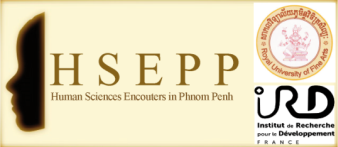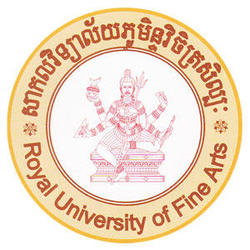Project initiators and partners
Initiators
UMI 233 trans VIH MI/INSERM U 1175
Université Royale des Beaux Arts Phnom Penh
Partners
http://sites.sas.upenn.edu/tlc/
logo tlcAgence Universitaire de la Francophonie - Bureau Asie Pacifique
HSEPP support the Manusastra Project
Khmer Rouge Effects and Aftereffects: Performance, Social Engagement, and Trauma as Legacies of Violence by Cheryl Yin, Linda Chhath & Lina Chhun
Khmer Rouge Effects and Aftereffects: Performance, Social Engagement, and Trauma as Legacies of Violence
by Cheryl Yin, Linda Chhath & Lina Chhun
‚ÄúCommunist Language Ideology: Performing Communist Language under the Khmer Rouge‚ÄĚ by Cheryl Yin.
Traditionally, Cambodian culture is hierarchical. One must respect one’s social superiors and one expects respect and deference from social inferiors. This hierarchy is reflected in the Khmer language through its elaborate honorific register. When the Khmer Rouge came into power in 1975, this culture of hierarchy and social difference was in direct conflict with communist ideology of egalitarianism. In order to flatten the hierarchy and promote a classless society, the Khmer Rouge sought to change Cambodian culture and the Khmer language. My talk will explore the Khmer Rouge’s language policies in relation to literature regarding:
- nationalism and nation-building (How does language play a role in newly formed nation-states?)
- language standardization (why did the Khmer Rouge feel the need to change and standardize the Khmer language?)
- performance and performative language (could Cambodians be described as ‚Äúperforming‚ÄĚ or ‚Äúfeigning‚ÄĚ communist language in order to survive?)
Because of the time limit, I will focus on the performative aspect. Did Cambodians have backstage (private) and front stage personas (public)?Did they put up a front in the presence of the Khmer Rouge, but take off their mask when in private? I argue that the performative aspect of language is what helped Cambodians feign compliance. They can use communist speech without believing in the actual words they were regurgitating. Speech has now become a tool for them to survive and to obtain resources (food, shelter, etc.).
Cheryl Yin’s Biography:
Cheryl Yin is a PhD candidate and fourth year graduate student in Linguistic Anthropology at the University of Michigan, Ann Arbor where she also received her Master’s degree in Linguistic Anthropology in 2014. She received two Bachelor’s degree in 2007 from Pitzer College in Claremont, California, in Anthropology and Linguistics. Cheryl is currently conducting research for her PhD dissertation on compulsory linguistic egalitarianism in Cambodia during the Khmer Rouge regime (1975-1979) and the impact those radical changes may have had on the everyday use of language, specifically honorifics, after the fall of the regime in 1979.
pagebreak
‚ÄúMahaGhosananda: Performing Dhamma for World Peace‚ÄĚ By Linda Chhath
In the aftermath of the Khmer Rouge MahaGhosananda was among the few highly trained Khmer monks to survive, having been outside of Cambodia since 1953 in pursuit of various Buddhist educational training. Beginning in the late 1980s he presented a Buddhist model for conduct, behavior, and thinking, in a manner to resolve immediate problems through his social work to reconcile the unstable and splintered reality of a post-Khmer Rouge Cambodia both locally and internationally. Reading his actions and words, this presentation will tease out the meaning behind MahaGhosananda‚Äôs self-presentation and articulate what I argue was his aim of teaching the ethics of social engagement for a Khmer audience who had ‚Äúsurvived‚ÄĚ but were continuing to suffer from deep social, mental and bodily scars.
Linda Chhath’s Biography:
Linda Chhath is a PhD candidate in the Department of Languages and Cultures of Asia at the University of Wisconsin, Madison. She holds a MA in Southeast Asian Studies from the University of Wisconsin, Madison and a BA in History and Anthropology from the University of California, Santa Cruz. She is in Cambodia conducting dissertation research on Buddhist ethical expressions and national and cosmopolitan social movements within the context of post-colonial nation building and ‚ÄúThird-World‚ÄĚ perspective, Cold War anxieties.
pagebreak
‚ÄúFeminist Re-readings and Affective Archives: Regarding Two Registers of Historical Trauma‚ÄĚ By Lina Chhun
In clinical models of trauma, silence and its various manifestations are read as pathology, as barriers to healing and recovery. Psychosomatic symptoms and experiences especially, are diagnosed as disorder‚ÄĒas physical falsehoods malingering women tell about their bodies. Narratives of violence and trauma are pushed into narrow categories of experience, a result of the demand for the construction of ‚Äúempowered identities‚ÄĚ founded upon the breaking of such pathologically-marked silences. These clinical as well as liberal discourses‚ÄĒespecially in the U.S.‚ÄĒhave largely come to define the experiences of not just individual, inter-personal violence, but also historical and collective experiences of violence.
The following paper proposes a feminist intervention into this framing of violence, silence, and pathology. Building upon and speaking back to previous narrative work I have done with family members, I use feminist frameworks to re-read the affective archives of the psychosomatic and hauntings in the afterlife of the Cambodian genocide. Using Jacqui Alexander’s notion of palimpsestic time and VeenaDas’ approach to voice and the everyday, this paper tentatively engages the potentialities of such re-readings for expanded discussions of healing after historical violence.
Lina Chhun’s Biography:
Lina Chhun is a PhD candidate and fourth year graduate student in the Department of Gender Studies at the University of California, Los Angeles (UCLA). Lina currently holds an MA in Gender Studies with a concentration in Asian American Studies from UCLA, an MS in Social Psychology from the University of California, Santa Cruz, and a BAS in Psychology and Women’s Studies from the University of California, Davis. Her research focuses on questions of memory, mediation, narrative, and the production of history in the afterlife of violence, with an attunement to registers/registerings of historical trauma relating to the Cambodian genocide of 1975-1979








